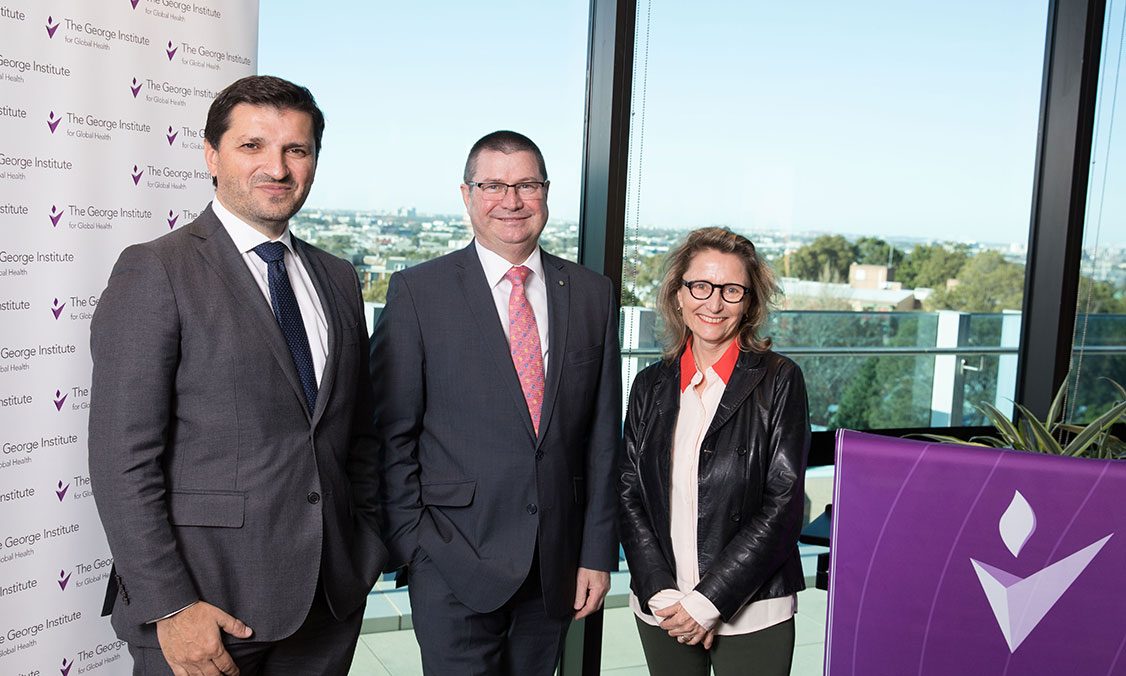
'A vision for creating a healthy Australia' with Martin Bowles PSM, Secretary, Department of Health
- The current and future challenges facing the health system
- How we can create a health system to meet Australia’s needs today, and tomorrow
- How to maximise opportunities to help improve health outcomes for all Australians
Federal Department of Health Secretary Martin Bowles outlined his vision for the future of healthcare in Australia at The George Institute this week.
Around 100 healthcare leaders and academics gathered at The George Institute’s global headquarters in Sydney. In his keynote speech and a Q & A, Mr Bowles talked about the challenges and opportunities that come with a rapidly changing world, especially with technology and an aging population and the need to place data, analytics and research at the centre of policy thinking.
Mr Bowles, who oversees a health budget of $94 billion, was speaking at The George Institute annual policy forum. He began by praising Australia’s healthcare system: “We do have a world-class health system…. and I quite often say to people if I'm going to be sick anywhere in the world I want it to be here.
"If you look at OECD measures, we're always well and truly up in the rankings there. Australia in those rankings comes out second in the world; and quite frankly, in the health outcome part of that, we actually come out number one.
“But there are a whole lot of things that we do need to keep a really close eye on. The sustainability for our health system in the long term is critical, because if we get that wrong we won't be able to maintain the range, if you like, in the great health system that we actually do have.
“We do need to do more in the system if we want to continue into the future for our kids and our kids' kids and future generations. And my whole thinking about this job has been how do we set this up - how we set my department up, which is a key player in the national stewardship of the health system - how we set it up to actually make sure we continue thinking like that?”
He then recognised that there are areas that need improvement, including Aboriginal and Torres Strait Islander health saying: “We still have statistics that you cannot believe.” Other areas that needed extra focus were Aged Care and healthcare provision in rural Australia where life expectancy is four to five years less than the national average.
Chronic disease which affects one in two Australians, with one in five suffering more than two conditions, and the obesity epidemic were also highlighted by Mr Bowles. “63 per cent of adults are overweight or obese; 27 per cent of children are overweight or obese. So it is a significant issue we need to grapple with.”
Watch the live stream of the event
Huge challenges which Mr Bowles said can be met by focusing on strategic policy and innovation. “How do we develop the future ideas, whether those future ideas are used today, tomorrow, five years’ time…..? What are we doing about thinking about our system? I think it’s really important that that’s where we – at the Department of Health – put a lot of effort.
“What I also did is put data, analytics, evaluation, and research at the centre of that policy thinking, because if we don’t understand what’s going on we’re really not going to have the right answers.”
Mr Bowles also spent time outlining the role that technology has to play in meeting future healthcare needs, and how it’s currently leading to around 65 per cent of the cost of growth in health care. Whilst recognising that the roll out of My Digital Health Record had been slow, Mr Bowles said he was confident the opt out system would see a huge uptake by the end of 2018 by every state and territory and that this would also deliver significant economic benefits by reducing duplication of services and medical errors.
Patient centred care was also highlighted. “We’ve got to remember around patients and consumers more broadly is they’re not a homogenous group… Patient needs are different.
“We want a system that actually puts the patient at the centre and a whole range of our policy positions at the moment are about trying to look at how do we actually think about the patient.”
There was also a focus on creating an efficient healthcare system with Mr Bowles revealing that in public hospitals price growth had been reduced to 1.5 per cent, down from 5.5 per cent just five years ago. A state of affairs he said was ‘unheard of” but had not led to a growth in waiting lists.
But he also warned there was no ‘quick fix. Reform of the health system is a long term issue. We need to look at this as an economic driver, a workforce driver and something that we do need to look at into the long term.”
Principal Director of the George Institute, Professor Robyn Norton, said: “Today’s event is part of our ongoing commitment to engage the community, to engage key stakeholders, to address the questions of how best to prevent, manage and deliver better healthcare for Australians and the world.”
The audience included representatives from BUPA, Black Dog Institute, The Heart Foundation, Cancer Drug Alliance, Merck and Arthritis Australia.




